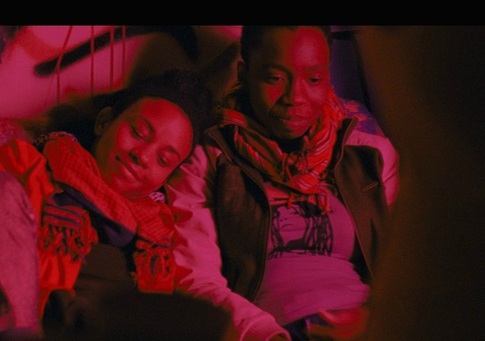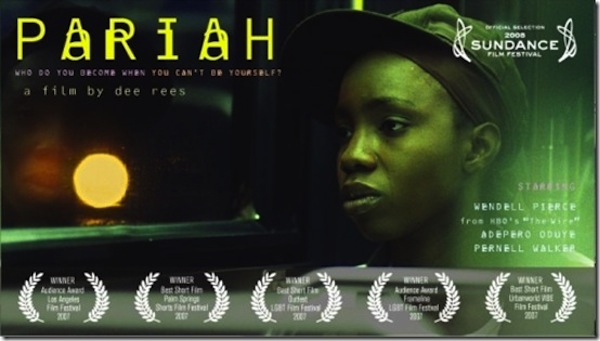Pariah
With April being National Poetry Month, Parish picked a
convenient time to come to The Neon Movies.
An astounding, vibrant piece of finely weaved storytelling and thoughtfully spoken artistry, this independent film centers on Brooklyn high school teen, Alike (pronounced ah-lik-e) an
exceptionally good student and aspiring poet from a hard working middle class
family. In her underground world, the shy girl hangs out with bold, outspoken,
Laura, who has already proudly come out and lives with her sister.
Alike, however, is much too afraid of such honesty and chooses
to entrap herself with dual identities- switching from hood gear to chic fashion, she is trying to do right by parents, Arthur and Audrey, but it's her little sister, Sharonda that begins suspecting the truth first.
Filled with hilarity, wit, and
compassion, viewers follow Alike’s course of adolescence as she tries
unsuccessfully talking to women, tests out her first strap on with Laurie’s
aide, writes poetry in a colorful composition notebook, and privately shares her talents with the encouraging English teacher.
All the while Audrey is desperate to make Alike appear
more feminine and attractive to boys and wishing Alike to stop
hanging around Laura, someone she clearly detests. Yet Arthur
turns a blind eye, seeming not to give a care about his overbearing wife’s feelings and accepts Alike "flaws" and all.
 |
| Bina and Alike in the stages of love. |
Fed up with Laura, an interfering Audrey wants Alike to be friends with "normal" girl, Bina. But unbeknownst to Audrey, Bina shows the kind of interest in Alike that would have had her head spinning. A smart, intelligent, and worldly artistic individual, she shares a lot of compelling ideas and music with Alike, striking up a friendship that soon blossoms into a refreshing first love.
Spending time at clubs and critiquing each others writings, things were so blissful.
However, her immediate discarding of their relationship
the morning after was quite detrimental and heartbreaking.
Alike breaks down, guttural and hurt by the strange 180, but sadly has no one to tell and transforms that anguish into poetry.
 |
| Alike with Audrey during happier times |
Once Alike finally confesses to her parents, hell breaks loose tenfold.
In the very turbulent scene, Sharonda pleas with Alike not
to get in between the battle of their parents who are loudly arguing about her
sexual orientation, but valiant Alike bravely wages on and puts up with an
emotionally distressed Audrey who then verbally attacks and violently beats
her revulsion into Alike.
After that climatic horror, things change.
 |
| Alike and Arthur after that horrible scene. |
With a condoning mother seeing lesbianism as a treacherous
disease deemed unlovable, Arthur is the exact opposite. A man harboring his
own secrets, he seemed to have always known that Alike was a unique case. Not
due to her escalating intelligence and her disdain for pretty clothing. Their
relationship is much closer and because of this, it makes his understanding of
Alike’s lifestyle believable.
 |
| Sharonda loves her sister no matter what! |
In Laura’s own story, she also has a mother disgusted by
her choices. Looking disgusted, she makes no move to be affectionate and slams
the door in Laura’s face even as Laura expresses joy over passing the GED. This
makes her friendship to Alike all the more genuine. Their mothers' dislike for their lifestyle
Though she is an active flirt and very popular with the
ladies, it’s perfectly clear that Laurie needs constant companionship and love
and once she sees Alike having fun with Bina, her jealousy comes clawing
out.
A worthy note of mention, Dee Rees has done an
exceptional job of not only showcasing strong female relationships, but also
revealing the blunt shift that occurs when weakened and severed, especially the
natural bond of a mother and daughter.
 |
| The lovely, talented Adepero Oduye. |
Adepero Oduye’s portrayal is touching, riveting, and
beautiful as she plays a character struggling with the great divide, breaks
free from timidity, and falls in love. Breathing sophisticated complexion into Alike, Oduye is divine
poetry in motion, expelling words articulately and with tenderly, perfected bravado. From the moment she tearfully tells her mother she loves her
and that end scene on the bus, Oduye showcases Alike’s proud acceptance into a
promising future that only she can control.
Now this is the kind of African American role that the
Academy is deadest against honoring. A woman who doesn’t allow herself to
repressed by negativity and has the strength to move forward to better
opportunities with talent driving her. To the conservative viewer- it’s
crucial. Not only is this young African American woman smart and gifted, she
happens to be gay.
Definitely robbed of an Oscar nod, here's hoping that Oduye nabs another pivotal role that garners attention from the snubbing Hollywood elite.
The rest of the cast played their parts commendably, especially the incredible Kim Wayans, a famed comedian utterly unrecognizable in a very dramatic role. The polar opposite of Monique's character in Precious, Wayans was marvelous as the cruelly ashamed, Bible clinging mother.
 |
| Laura trying to change up Alike's fashion sense! |
In terms of story holes, Pariah does have its little flaws.
Alike delivers two powerful poems like a heavenly
prophet. Thirsting for more, especially with Bina making suggestions to open
mic nights and poetry clubs, there was an expectancy to seeing Alike come
further out of her shell and share her gifts to an audience that actually wants
to hear fresh talent onstage.
Alas no such scenes came into play.
What of Laura and Alike's relationship?
Do they come together as a couple and bond even further?
What secrets was Arthur keeping under tabs?
A scene of him on the phone and then changing into a silk black shirt while chatting to Alike seemed oddly questionable. With them being so close, one imagined that he would voice his affair to Alike.
Now if it were with another man, Audrey would never be the same...
 |
| Actress Adepero Oduye, Pariah Writer/Director, Dee Rees, and Actress Kim Wayans |
I greatly appreciate the woman’s voice and their courage to
tell such a profound story. Hoping that Dee Rees continues on the path of
enlightening women and minorities to come forth and share their creative
vision, bring their enriching narratives to independent screens and beyond. Let the age old statistics of white men being sole judge and victor be a thing of the past.
It's been high time for segregation in the film honor system to be buried.
Women have more than breasts to bare, they have vocal hearts and fervent souls to unleash and set free.
Pariah passionately illustrates that though the uncertain future can be
filled with failures, heartbreak, and disappointments, there are rewards
despite the ugly, gritty turmoil that comes and goes.
That wherein lies life's bittersweet poetry.



Comments
Post a Comment